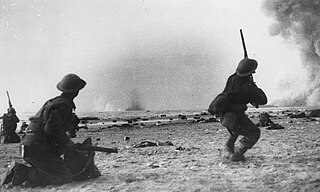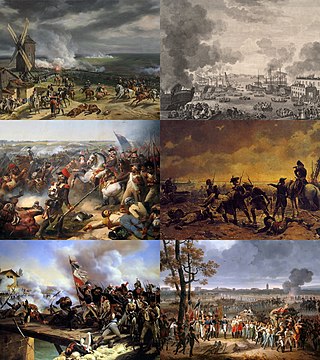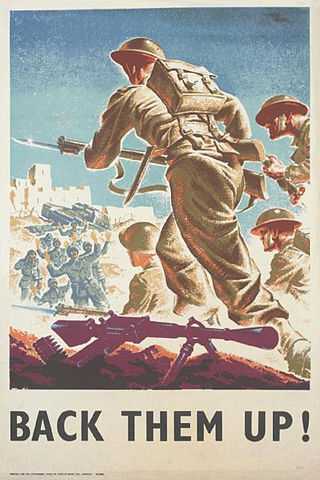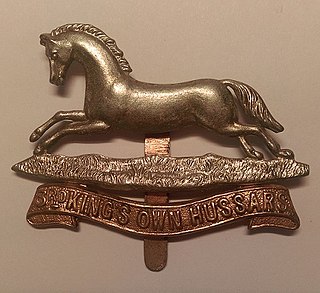See also
- Dunkirk (disambiguation)
- Dunkirk evacuation, a major military operation that took place during the 1940 Battle of Dunkirk
The Battle of Dunkirk was a conflict between French and British allies and German forces in 1940 during the Second World War.
Battle of Dunkirk, Raid on Dunkirk or Siege of Dunkirk may also refer to:

The War of the Austrian Succession was a European conflict fought between 1740 and 1748, primarily in Central Europe, the Austrian Netherlands, Italy, the Atlantic Ocean and Mediterranean Sea. Related conflicts include King George's War in North America, the War of Jenkins' Ear, the First Carnatic War, and the First and Second Silesian Wars.

The Battle of Dunkirk was fought around the French port of Dunkirk (Dunkerque) during the Second World War, between the Allies and Nazi Germany. As the Allies were losing the Battle of France on the Western Front, the Battle of Dunkirk was the defence and evacuation of British and other Allied forces to Britain from 26 May to 4 June 1940.

Dunkirk is a major port city in the department of Nord in northern France. It lies 10 kilometres (6.2 mi) from the Belgian border. It has the third-largest French harbour. The population of the commune in 2019 was 86,279.

The Battle of Denain was fought on 24 July 1712 as part of the War of the Spanish Succession. It resulted in a French victory, under Marshal Villars, against Dutch and Austrian forces, under Prince Eugene of Savoy.

The War of the First Coalition was a set of wars that several European powers fought between 1792 and 1797, initially against the constitutional Kingdom of France and then the French Republic that succeeded it. They were only loosely allied and fought without much apparent coordination or agreement; each power had its eye on a different part of France it wanted to appropriate after a French defeat, which never occurred.

The military history of the United Kingdom in World War II covers the Second World War against the Axis powers, starting on 3 September 1939 with the declaration of war by the United Kingdom and France, followed by the UK's Dominions, Crown colonies and protectorates on Nazi Germany in response to the invasion of Poland by Germany. There was little, however, the Anglo-French alliance could do or did do to help Poland. The Phoney War culminated in April 1940 with the German invasion of Denmark and Norway. Winston Churchill became prime minister and head of a coalition government in May 1940. The defeat of other European countries followed – Belgium, the Netherlands, Luxembourg and France – alongside the British Expeditionary Force which led to the Dunkirk evacuation in June 1940.

Admiral Sir Bertram Home Ramsay, KCB, KBE, MVO was a Royal Navy officer. He commanded the destroyer HMS Broke during the First World War. In the Second World War, he was responsible for the Dunkirk evacuation in 1940 and planning and commanding the naval forces in the invasion of France in 1944.

The Anglo-Spanish War was a conflict between the English Protectorate and Spain between 1654 and 1660. It was driven by the economic and religious rivalry between the two countries, with each side attacking the other's commercial and colonial interests in various ways, such as privateering and naval expeditions.

The Netherlands, as a nation state, dates to 1568, when the Dutch Revolt created the Dutch Empire. Previously, the Germanic tribes had no written language during the ancient and early medieval periods, so what we know about their early military history comes from accounts written in Latin and from archaeology. This causes significant gaps in the historic timeline. Germanic wars against the Romans are fairly well documented from the Roman perspective; however, Germanic wars against the early Celts remain mysterious because neither side recorded the events. Wars between the Germanic tribes in Northern Belgium and the present day Netherlands, and various Celtic tribes that bordered their lands, are likely due to their geographical proximity.

The 3rd Hussars was a cavalry regiment of the British Army, first raised in 1685. It saw service for three centuries, including the First and the Second World Wars, before being amalgamated with the 7th Queen's Own Hussars, to form the Queen's Own Hussars in November 1958.

The Free Belgian forces were soldiers from Belgium and its colonies who fought as part of the Allied armies during World War II, after the official Belgian surrender to Nazi Germany. It is distinct from the Belgian Resistance which existed in German-occupied Belgium.

The military history of the United Kingdom covers the period from the creation of the united Kingdom of Great Britain, with the political union of England and Scotland in 1707, to the present day.

The Low Countries theatre of the War of the First Coalition, also known as the Flanders campaign, was a series of campaigns in the Low Countries conducted from 20 April 1792 to 7 June 1795 during the first years of the War of the First Coalition. As the French Revolution radicalised, the revolutionary National Convention and its predecessors broke the Catholic Church's power (1790), abolished the monarchy (1792) and even executed the deposed king Louis XVI of France (1793), vying to spread the Revolution beyond the new French Republic's borders, by violent means if necessary. The First Coalition, an alliance of reactionary states representing the Ancien Régime in Central and Western Europe – Habsburg Austria, Prussia, Great Britain, the Dutch Republic, Hanover and Hesse-Kassel – mobilised military forces along all the French frontiers, threatening to invade Revolutionary France and violently restore the monarchy. The subsequent combat operations along the French borders with the Low Countries and Germany became the primary theatre of the War of the First Coalition until March 1796, when Napoleon took over French command on the Italian front.
Battle of Alexandria, Raid on Alexandria, or Siege of Alexandria may refer to one of these military operations fought in or near the city of Alexandria, Egypt:

The history of Gibraltar, a small peninsula on the southern Iberian coast near the entrance of the Mediterranean Sea, spans over 2,900 years. The peninsula has evolved from a place of reverence in ancient times into "one of the most densely fortified and fought-over places in Europe", as one historian has put it. Gibraltar's location has given it an outsized significance in the history of Europe and its fortified town, established in the Middle Ages, has hosted garrisons that sustained numerous sieges and battles over the centuries.

The siege of Dunkirk in 1658 was a military operation by France and the Commonwealth of England intended to capture the fortified port city of Dunkirk, Spain's greatest privateering base, from a Spanish garrison strengthened with English Royalists and French Fronduers. Dunkirk was a strategic port on the southern coast of the English Channel in the Spanish Netherlands that had often been a point of contention previously and had changed hands a number of times. Privateers operating out of Dunkirk and other ports had cost England some 1,500 to 2,000 merchant ships in the past year. The French and their English Commonwealth allies were commanded by Marshal of France Turenne. The siege would last a month and featured numerous sorties by the garrison and a determined relief attempt by the Spanish army under the command of Don Juan of Austria and allied English Royalists led by Duke of York and rebels of the French Fronde under the Great Condé that resulted in the battle of the Dunes.
Siege of Antwerp may refer to: